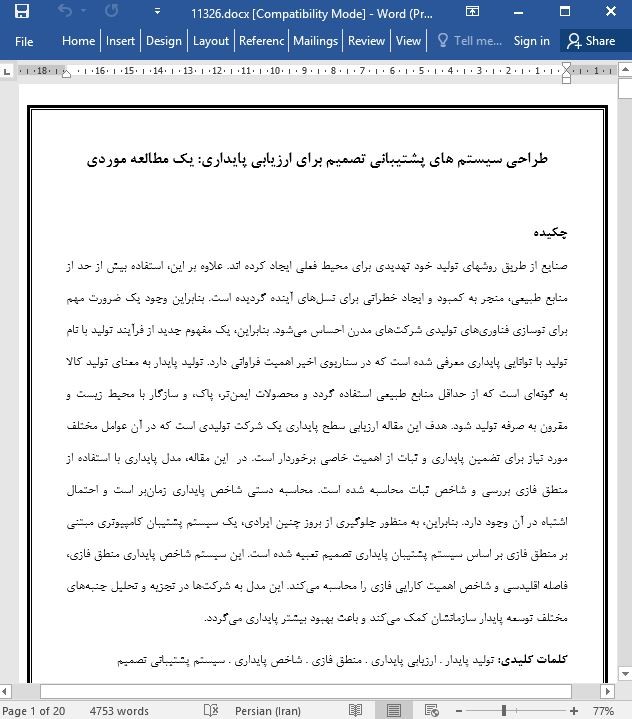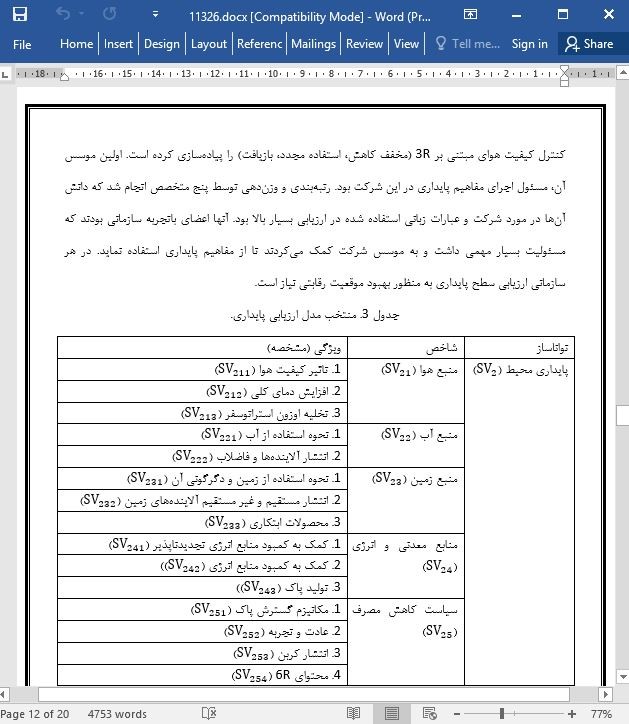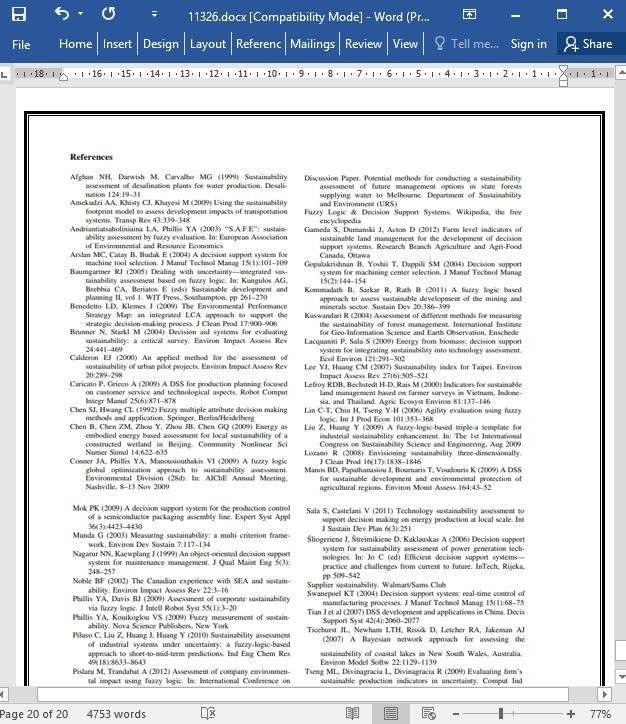
طراحی سیستم های پشتیبانی تصمیم برای ارزیابی پایداری
چکیده
صنایع از طریق روشهای تولید خود تهدیدی برای محیط فعلی ایجاد کرده اند. علاوه بر این، استفاده بیش از حد از منابع طبیعی، منجر به کمبود و ایجاد خطراتی برای نسل های آینده گردیده است. بنابراین وجود یک ضرورت مهم برای نوسازی فناوری های تولیدی شرکت های مدرن احساس می شود. بنابراین، یک مفهوم جدید از فرآیند تولید با نام تولید با توانایی پایداری معرفی شده است که در سناریوی اخیر اهمیت فراوانی دارد. تولید پایدار به معنای تولید کالا به گونه ای است که از حداقل منابع طبیعی استفاده گردد و محصولات ایمن تر، پاک، و سازگار با محیط زیست و مقرون به صرفه تولید شود. هدف این مقاله ارزیابی سطح پایداری یک شرکت تولیدی است که در آن عوامل مختلف مورد نیاز برای تضمین پایداری و ثبات از اهمیت خاصی برخوردار است. در این مقاله، مدل پایداری با استفاده از منطق فازی بررسی و شاخص ثبات محاسبه شده است. محاسبه دستی شاخص پایداری زمان بر است و احتمال اشتباه در آن وجود دارد. بنابراین، به منظور جلوگیری از بروز چنین ایرادی، یک سیستم پشتیبان کامپیوتری مبتنی بر منطق فازی بر اساس سیستم پشتیبان پایداری تصمیم تعبیه شده است. این سیستم شاخص پایداری منطق فازی، فاصله اقلیدسی و شاخص اهمیت کارایی فازی را محاسبه می کند. این مدل به شرکت ها در تجزیه و تحلیل جنبه های مختلف توسعه پایدار سازمانشان کمک می کند و باعث بهبود بیشتر پایداری می گردد.
مقدمه
شرکت های تولیدی مدرن مجبور به اتخاذ اصول تولید پایدار منطبق بر مقررات اجباری سیاست های دولت هستند. در نتیجه نیاز به توسعه محصولات دوست دار محیط زیست بوجود می آید. پایداری شامل ابعاد زیست محیطی، اقتصادی و اجتماعی است. از این رو، ارزیابی پایداری باید یک رویکرد جامع و کل نگر باشد. با توجه به اشکالات موجود در روش های سنتی، استفاده از روش فازی اهمیت می یابد. از این رو، نیاز به ارزیابی پایداری مبتنی بر فازی قابل درک می گردد. با توجه به پیچیدگی هایی که ارزیابی پایداری مبتنی بر منطق فازی دارد، در مقاله ما، یک سیستم پشتیبانی تصمیم ارزیابی پایداری مبتنی بر منطق فازی (FLBSE-DSS) طراحی و مستقر شده است. نوآوری مطالعات ما که در این مقاله ذکر شده است، توسعه یک DSS منحصر به فرد برای ارزیابی پایداری در یک محیط فازی است. همچنین، امکان سنجی عملی DSS توسعه یافته در یک محیط تولید زمان حقیقی، مورد بررسی قرار گرفته است. ویژگی های مفهومی و مکانیزم کاری FLBSE-DSS در این مقاله ارائه خواهد شد.
نتیجه گیری
توسعه پایدار دارای مزایای پایداری دراز مدت، و رقابتی برای سازمان های تولیدی است. در این زمینه، ارزیابی پایداری بسیار نیاز است. به منظور محاسبه و تجزیه و تحلیل مرتب پایداری یک سازمان، FLBSE- DSS ایجاد شد. FLBSE-DSS توسعه یافته، شاخص پایداری سازمان را محاسبه می کند و FPII را برای مشخصه های مختلف پایداری تولید می کند. در این مقاله، FLSI یک سازمان برابر (2.938 و 4.396 و 5.869) شد. با استفاده از روش فاصله اقلیدسی، ثابت شد که سازمان مربوطه پایدار است. علاوه بر تعیین شاخص پایداری و فاصله اقلیدسی، همچنین مشخصه های ناپایدارتر (با پایداری ضعیف) مانند اثرات کیفیت هوا، راه کار 6R، تولید سبز، و کربن توسط DSS به عنوان مناطق ضعیف شناسایی شد. پس از حذف یا کاهش حوزه های ضعیف، نتایج مناسبی به دست می-آید و در سازمان پیاده سازی می گردد.
Abstract
The industries have created threat to the present environment through their manufacturing methods. Moreover, the excessive utilization of natural resources have led to scarcity and triggered danger for the future generations. So there exists a vital need for the modern companies to renovate their manufacturing technologies. Thus, a new concept of manufacturing process known as sustainable manufacturing has been introduced and it gained great importance in the present scenario. Sustainable manufacturing means the production of goods in such a way that it utilizes minimum natural resources and produces safer, cleaner, and environment-friendly products at an affordable cost. The purpose of this article is to assess the sustainability level of a manufacturing organization taking into consideration various factors needed for insuring sustainability. During the course of this research, a sustainability model was developed using fuzzy logic and the sustainability index was calculated. Manual calculation of sustainability index consumes more time and it is mistake prone. So, in order to avoid such inadequacies, a computerbased decision support system was developed designated as fuzzy-logic-based sustainability evaluation decision support system. The system calculates the fuzzy logic sustainability index, Euclidean distance, and fuzzy performance importance index. This model will help the companies to analyze various aspects of sustainability within their organization and work toward further improvement of it.
Introduction
The modern manufacturing organizations are forced to adopt sustainable manufacturing principles due to regulations enforced by Government policies. As a sequel to it, the need for developing environmentally friendlier products arises. Sustainability includes environmental, economic, and social dimensions. Hence, the assessment of sustainability must be a comprehensive and holistic approach. Due to the drawbacks associated with traditional methods, the usage of fuzzy methods gains importance. Hence, the requirement for fuzzy-based sustainability evaluation was realized. Due to the complexity associated with fuzzy-based sustainability evaluation, fuzzy-logicbased sustainability evaluation decision support system (FLBSE-DSS) was designed and deployed in our study. The novelty of the study reported in this article is the development of exclusive DSS for sustainability evaluation in a fuzzy environment. Also, the practical feasibility of the developed DSS was test implemented in a real time manufacturing environment. The conceptual features and working mechanism of FLBSE-DSS will be presented in this article.
Conclusions
Sustainable development insures sustainable, long-term, and competitive benefits for manufacturing organizations. In this context, the evaluation of sustainability is very much needed. In order to systematically compute and analyze sustainability of the case organization, FLBSEDSS was developed. The developed FLBSE-DSS computes the sustainability index of the organization and generates FPII for various sustainability attributes. In this present study, FLSI of the organization was found to be (2.938, 4.396, 5.869). Using Euclidean distance approach, the organization was found to be sustainable. Besides determining sustainability index and Euclidean distance, DSS also identifies weaker sustainability attributes like air quality effects, 6R concepts, green manufacturing, and carbon foot-print as weaker areas. After mitigating the weaker areas, suitable initiatives were derived and subjected to implementation in the case organization.
چکیده
مقدمه
بررسی ادبیات
بررسی ادبیات در مورد ارزیابی پایداری
بررسی آثار موجود در برنامه های منطق فازی
بررسی آثار مرتبط به برنامه های سیستم پشتیبانی تصمیم
روش شناسایی
روش ارزیابی پایداری مبتنی بر منطق فازی
محاسبه FLSI
فاصله اقلیدسی
محاسبه FPII
مطالعه موردی
مدل مفهومی
ساختار DSS
نتایج و مباحثه
استنباط عملی
نتیجه گیری
Abstract
Introduction
Literature review
Literature review on fuzzy logic applications
Literature review on decision support system applications
Methodology of fuzzy-logic-based sustainability evaluation
Calculation of FLSI
Euclidean distance
Calculation of FPII
Case study
Conceptual model
DSS architecture
Results and discussions
Practical implications
Conclusions
- ترجمه فارسی مقاله با فرمت ورد (word) با قابلیت ویرایش، بدون آرم سایت ای ترجمه
- ترجمه فارسی مقاله با فرمت pdf، بدون آرم سایت ای ترجمه



